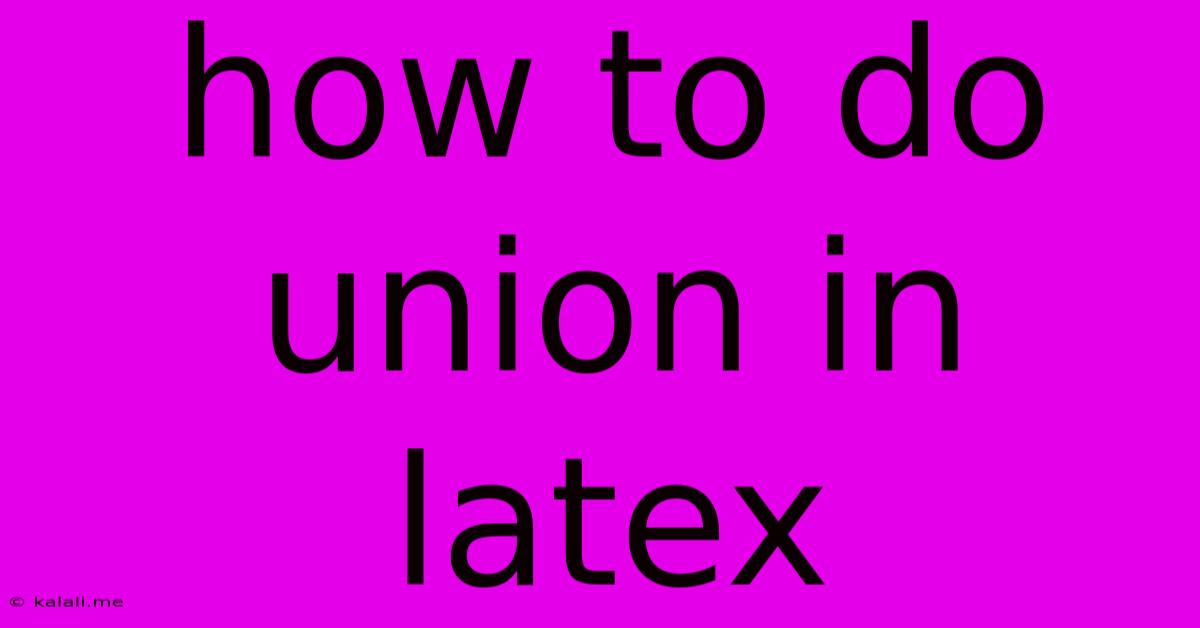How To Do Union In Latex
Kalali
May 31, 2025 · 3 min read

Table of Contents
How to Do a Union in LaTeX: A Comprehensive Guide
Creating visually appealing and mathematically accurate documents is a hallmark of LaTeX. This guide delves into the various methods for representing the union symbol (∪) and the set union operation within your LaTeX documents, catering to different levels of complexity and aesthetic preferences. This includes discussions on proper notation for set theory, ensuring your mathematical expressions are both clear and correctly formatted for optimal readability and SEO.
Understanding Set Union in Mathematics
Before diving into the LaTeX implementation, let's briefly refresh the mathematical concept. The union of two sets, A and B, denoted as A ∪ B, is a new set containing all elements that are in A, or in B, or in both. This forms the basis for many mathematical operations and proofs. Understanding this foundational concept is crucial for correctly representing it in LaTeX.
Basic Union Symbol: \cup
The simplest way to represent the union symbol in LaTeX is using the command \cup. This command produces a standard, upright union symbol.
A \cup B
This will render as: A ∪ B
This is perfect for basic set union representation in your mathematical text.
Large Union Symbols: \bigcup
For representing the union of a larger collection of sets, say, an infinite number of sets indexed by a variable, you'll need the \bigcup command. This produces a larger, more visually distinct union symbol.
\bigcup_{i=1}^{\infty} A_i
This will render as: ⋃<sub>i=1</sub><sup>∞</sup> A<sub>i</sub>
This illustrates the union of sets A<sub>i</sub> from i=1 to infinity. Notice how we've also used subscript and superscript commands for proper notation.
Customization and Font Selection
The appearance of your union symbol can be subtly altered depending on your chosen LaTeX package and font. Packages like amsmath and amssymb provide extensive support for mathematical symbols and may offer alternative styles for the union symbol. Experiment with different fonts and packages to find the style that best suits your document’s aesthetic.
Beyond the Symbol: Writing About Set Union
While the symbol itself is important, remember to provide context! Clearly define the sets involved, explain the operation, and use complete sentences whenever possible. Don't just present the symbol in isolation; incorporate it seamlessly within your mathematical explanations and proofs. For example:
"The union of set A, containing {1, 2, 3}, and set B, containing {3, 4, 5}, is represented as A ∪ B = {1, 2, 3, 4, 5}."
Practical Applications and Examples
Consider these examples to solidify your understanding:
- Probability Theory: When calculating the probability of an event occurring in at least one of two independent events.
- Topology: Defining open sets and neighborhoods within a topological space.
- Linear Algebra: Describing spans of vectors or the union of subspaces.
Troubleshooting and Common Mistakes
- Missing Packages: Ensure you have the necessary packages included in your LaTeX preamble (e.g.,
\usepackage{amsmath}). - Incorrect Spacing: Use
\,for a small space around the symbol to improve visual clarity. - Font Conflicts: Sometimes, font conflicts can alter the appearance of symbols. Try experimenting with different font packages.
By following these guidelines and practicing with different examples, you'll master the art of representing set union in LaTeX, creating clear, accurate, and visually appealing mathematical documents. Remember to always prioritize clarity and precision in your mathematical writing, ensuring your work is easily understood by both human readers and search engine crawlers.
Latest Posts
Latest Posts
-
How To Mount A Shelf To Drywall
Jun 02, 2025
-
Using My Husband Credit Card In Europe
Jun 02, 2025
-
Diy Garage Ventilation System For Resin Printer
Jun 02, 2025
-
How To Remove Stamp Ink From Skin
Jun 02, 2025
-
How To Keep Eyeglasses From Slipping Down Nose
Jun 02, 2025
Related Post
Thank you for visiting our website which covers about How To Do Union In Latex . We hope the information provided has been useful to you. Feel free to contact us if you have any questions or need further assistance. See you next time and don't miss to bookmark.